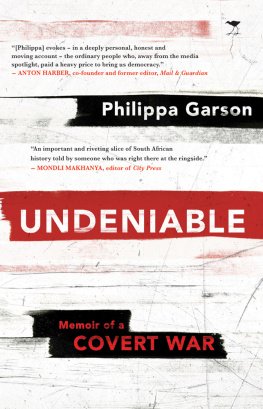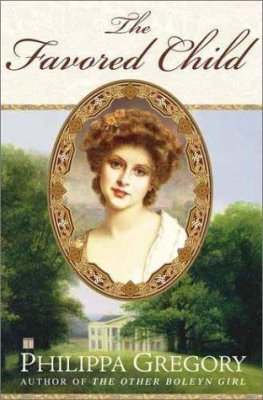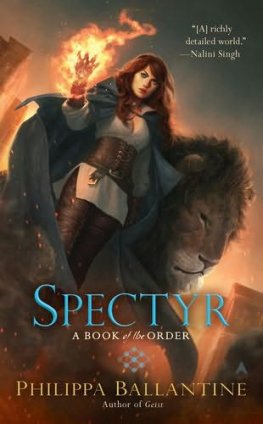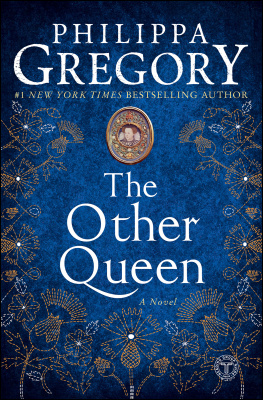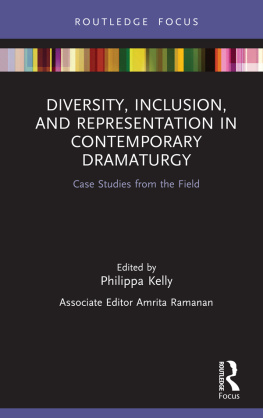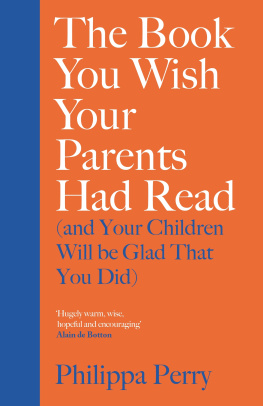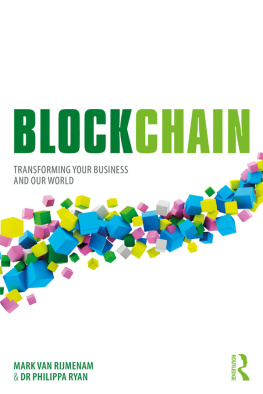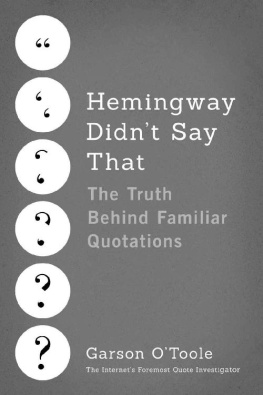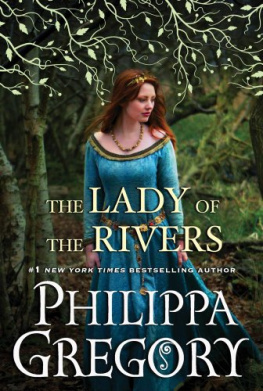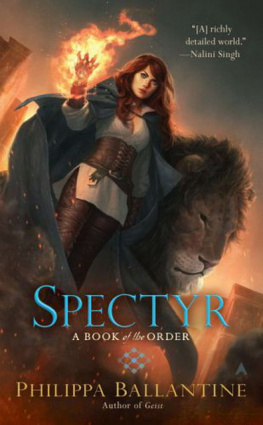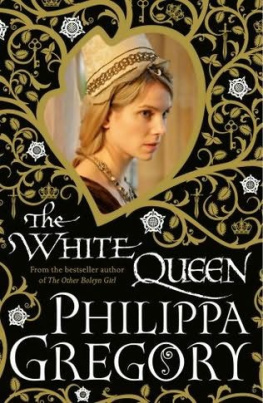Philippa Garson - Undeniable
Here you can read online Philippa Garson - Undeniable full text of the book (entire story) in english for free. Download pdf and epub, get meaning, cover and reviews about this ebook. publisher: Jacana Media, genre: Detective and thriller. Description of the work, (preface) as well as reviews are available. Best literature library LitArk.com created for fans of good reading and offers a wide selection of genres:
Romance novel
Science fiction
Adventure
Detective
Science
History
Home and family
Prose
Art
Politics
Computer
Non-fiction
Religion
Business
Children
Humor
Choose a favorite category and find really read worthwhile books. Enjoy immersion in the world of imagination, feel the emotions of the characters or learn something new for yourself, make an fascinating discovery.
- Book:Undeniable
- Author:
- Publisher:Jacana Media
- Genre:
- Rating:3 / 5
- Favourites:Add to favourites
- Your mark:
- 60
- 1
- 2
- 3
- 4
- 5
Undeniable: summary, description and annotation
We offer to read an annotation, description, summary or preface (depends on what the author of the book "Undeniable" wrote himself). If you haven't found the necessary information about the book — write in the comments, we will try to find it.
Undeniable — read online for free the complete book (whole text) full work
Below is the text of the book, divided by pages. System saving the place of the last page read, allows you to conveniently read the book "Undeniable" online for free, without having to search again every time where you left off. Put a bookmark, and you can go to the page where you finished reading at any time.
Font size:
Interval:
Bookmark:

Undeniable
First published by Jacana Media (Pty) Ltd in 2020
10 Orange Street
Sunnyside
Auckland Park 2092
South Africa
+2711 628 3200
www.jacana.co.za
Philippa Garson, 2020
All rights reserved.
978-1-4314-3015-4 d-PDF
978-1-4314-3016-1 ePUB
978-1-4314-3017-8 mobi file
Shot Down, words and music by James Phillips 1975 Shifty Music
Black President, words and music by Chicco Twala/Brenda Fassie 1994 Gallo Music Publishers/Legacinova
Boipatong, words and music by Brenda Fassie/Selwyn Shandel 1994 Gallo Music Publishers/Legacinova
Meet Me in the Morning, words and music by Bob Dylan 1974 by Rams Horn Music; renewed 2002 Rams Horn Music
Cover design by publicide
Editing by Russell Martin
Proofreading by Lara Jacob
Index by Megan Mance
Set in Ehrhardt 11/15pt
Job no. 003657
See a complete list of Jacana titles at www.jacana.co.za
To the memory of the thousands of people killed during the season of violence that preceded South Africas first democratic elections

Compiled by Simphiwe Gumede

Compiled by Simphiwe Gumede
One does not become enlightened by imagining figures of light, but by making the darkness conscious.
Carl Jung
THANKS (IN ALPHABETICAL ORDER) to those who gave generously of their time and knowledge for my background research for this book: Gilbert Satch Chawe, Steve Collins, Madeleine Fullard, Richard Goldstone, Verne Harris, Nick Howarth, Ronnie Kasrils, Jan-Ak Kjellberg, Kobus Chappie Klopper, Fred Kockott, Ivor Jenkins, Robert McBride, Nhlanhla Mthethwa, Duma Nkosi, Janine Rauch, Piers Pigou, Robbie Potenza, Grant Rex, Beatrice Roberts, Nicky Rousseau, Moe Shaik, Chris Thirion, Hennie van Vuuren, Howard Varney, and Zulu and Zorro from Phola Park.
Im grateful for the assistance and/or advice of many others, including Anton Harber, Claire Wright, Dugan Fraser, Meg Rickards, Sally Sealey, Natasha Christopher, Justin Sholk, Irwin Manoim, Karen Martin, Rita Potenza, Gian Potenza, Sara Blecher, the helpful staff at the South African History Archives, Wits Universitys William Cullen library and Nelson Mandela Foundation. Id also like to thank author and writer Melissa Febos and the members of my erstwhile New York writing group.
A big thanks to my publisher Maggie Davey for her unfailing encouragement, humour and charm, and to Bridget Impey, Russell Martin, Lara Jacob, Megan Mance, Janine Daniel and other members of the Jacana team.
Id like to thank Lloyd Ross (Shifty Records) for granting me permission to use lyrics from James Phillips Shot Down; Gallo Records, Legacinova and Selwyn Shandel for permission to use lyrics from Brenda Fassies Black President and Boipatong; and the Bob Dylan Music Company for permission to use lyrics from Meet Me in the Morning.
Id also like to thank Mondli Makhanya and all my other former colleagues at the Weekly Mail, many who dont appear in these pages but who were so much a part of this story too.
I owe a depth of gratitude to my dear friends and patient readers Neville Hoad, Martin Scherzinger, Toni Gottlieb and Shaun de Waal whose advice and generous editing help proved invaluable. And to my Famous Four friends Kathy Davidson, Dianne Smart, Sue Spencer for their rock-solid friendship; and to my many other friends whove supported me.
Thanks to my beloved parents, Yvonne and Noel Garson; my sisters, Lisa, Catherine and Fiona; my husband Charles; and my three daughters, Alice, Leah and Ella.
Finally, Id like to thank the many people whose lives and hardships I witnessed up close during those fraught years. They taught me so much.
IN 2008 I MOVED WITH MY FAMILY TO NEW YORK to try out a new life. During long periods of loneliness and grief at leaving the country of my birth and my beloved extended family, I began to write about the traumatic events that Id witnessed during my time as a reporter at the Weekly Mail (now Mail & Guardian), events that had been buried in the recesses of my memory for years.
These events took place during the tumultuous period from 1990 to 1994, after Nelson Mandelas release and before democratic elections, when an orgy of violence was visited on the country, resulting in the deaths of at least fourteen thousand people.
The more I revisited this time, the more I tossed and turned at night. It was as if I was tapping into a momentous river of anguish that runs silently under the soil of this country. Increasingly, I felt driven to shed light on this blood-soaked chapter in the countrys history, one that has been airbrushed out of our collective consciousness.
The transition to democracy was indeed a miracle: the country was spared the full-scale revolution that many saw as inevitable. But during the years preceding it, the nation swung between optimism and despair as breakthroughs in negotiations between the apartheid government and the African National Congress (ANC) were punctuated by massacres on trains, in homes, shebeens, hostels and elsewhere. The relentless and indiscriminate attacks on communities, often by unidentified gunmen, left deep scars on the land.
The Weekly Mail was a small newspaper intent on exposing the atrocities that unfolded. No matter our level of expertise, we journalists and photojournalists were thrust headfirst into reporting on the carnage and trying to unmask the third force behind it. Some colleagues, like Wally Mbele, were far more frequent visitors to the killing fields; and more senior journalists than I were covering the main political story or heading up investigations to uncover the hidden forces stoking the violence.
But this is the story of my own experiences as a reporter during this tumultuous time. It is also not an exhaustive historical account, but a documenting of events as they unfolded before me, and my attempt all these years later, to make sense of it all.
In these pages, I weave my personal story into the political one, charting my own loss of innocence as I, a privileged white party girl from a liberal-leaning household, traversed back and forth between colliding realities, all the while trying to navigate a cross-racial relationship during apartheids last days.
In the spirit of narrative non-fiction I have recreated scenes, some from memory, some from articles I wrote. I have also changed a few names where appropriate. Many of the characters in this book stay until the end; others are fleeting. The journalists lot is to badger their subjects with intrusive questions and then to move along, never to speak to them again, or to know how they fared. It is a blighted lot, a karmic load, which I reflect on in these pages. While I found it appropriate to name the nameless where possible, for the purposes of this story, the reader need not remember them all.
Although some may find the violence triggering, it is my specific intention to not sidestep the uncomfortable truth about this time. Hopefully, those perpetrators who evaded justice for the cynical war they stoked continue to be harassed by their consciences. For the rest who lost their loved ones, the thousands to whom this book is dedicated, no one can take away their suffering. It is theirs to bear and to own. The best one can do is to acknowledge it, which I hope, in some small way, this book does.
Font size:
Interval:
Bookmark:
Similar books «Undeniable»
Look at similar books to Undeniable. We have selected literature similar in name and meaning in the hope of providing readers with more options to find new, interesting, not yet read works.
Discussion, reviews of the book Undeniable and just readers' own opinions. Leave your comments, write what you think about the work, its meaning or the main characters. Specify what exactly you liked and what you didn't like, and why you think so.

